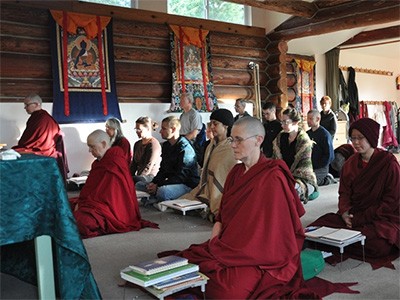Genuine aspiration and resistance
Genuine aspiration and resistance

Letter from J.
Dear Venerable Thubten Chodron,
I stumble around wanting to express to you how important the Dharma is to me, while at the same time confessing that I have not had the courage to attend to my daily practice for months. And yet there is nothing that makes my heart sing like the thought of going on pilgrimage with Ven. Robina or immersing myself in the Buddhadharma on a three-month retreat with you. I long for those two things more than anything else. And at the same time, they are the two things I am most terrified of.
So here I am, facing the twin aspects of addiction: craving and aversion. I am always operating out of some version of this dilemma of wanting that which I crave with all my heart and simultaneously being ready to fight to the death in order to keep that which I fear or abhor from coming too close. Often that which I crave and that which I fear are, on some fundamental level, one and the same things. From a certain angle, self-annihilation and awakening look the same. The constricted, deluded self dies as the expansive experience of no-self blossoms. Or something like that. But until I have a direct experience of awakening, it is just some pretty pictures and beautiful promises that I chase after much like I would chase after any other addiction. And so I become increasingly painfully aware of how much I operate out of craving and aversion in my daily life, how embedded addictive behavior is even in my practice, in my every deed, word, and thought. The vast landscape where I sow addiction is called ignorance, and I lie in that landscape where oblivion is my daily water. Everything I don’t know about, don’t care about, don’t want to know or care about is automatically pushed outside my awareness. It requires great effort to remain oblivious, but the habit is very powerful and I should never underestimate it.
Going on retreat is like checking into detox. It is purifying, tonifying, but I know the process of sweating out all that poison will bring me to my knees. Samsara, with all its violence and beauty and pathos and drama is a tremendous addiction. Even with all their destructiveness, my own ego, superiority, arrogance, and self-righteousness are overwhelming addictive drugs. So here I am, one part of me wanting with all my heart to put down the needles, the bottle, the gun, and walk to the other side. No big deal. Just give up everything and quietly open my eyes. And yet another part of me is powerfully and achingly grasping and clinging to every last one of its addictions. Part of every addict’s mind believes that life without the object of addiction is inconceivable. This part of the mind is highly adept at both denying the gravity of the illness and at inventing reasons and methods to perpetuate the habit. So, to some degree I have a fair sense of what I am up against. It’s awfully scary being mortal and trying to wake up all at the same time.
Yet I see countless students and teachers from every spiritual school step onto this path. For as long as humans have been around, it would appear that at the heart of every tribe and culture, within every individual’s heart of hearts, there is a nascent longing to commune with some kind of “Divine Grace,” to experience one’s own inseparability from the service of holiness, benevolence, and shunyata (emptiness). Wouldn’t Buddhists say this longing is part of our human (Buddha) nature? Yet wouldn’t you say that it is the nature of samsara to mistakenly try to fulfill this longing by pursuing worldly pleasures?
And so the Buddha said there is suffering. And here are the root causes of suffering. But the good news is there is a remedy. Here are the medicines. The tricky part is that each and every one of us must summon up the strength and the courage and the faith that allow us to choose to take the medicine one day after the next, no matter what. If I can choose one day at a time, and not think of the vows and precepts as encompassing eons of lifetimes, but just today, just this moment, do my best, then maybe maybe that will help soften the resistant addicted oh-so-ready–to-battle heart.
You know, underneath all these words is just a simple wish to connect on a heart level from me to you in the Dharma. Thank you for the encouragement, support, and guidance that you offer all of us. I’m not sure what I’m asking—maybe just for your patience and for a guiding nudge to point me forward.
J.
Response from Venerable Thubten Chodron
Dear J.,
I appreciate the honesty and humility of your letter. Almost everyone who sincerely approaches the Dharma encounters what you so accurately described—sincere spiritual aspirations and powerful resistance to doing what it takes to actualize them. In the habit of ego, we turn even the path to enlightenment into an internal civil war.
How to break out of this? One thing is to call addiction on its own tricks. Not blame, not battle, but simply with self-respect and care for ourselves to note, “Here’s my resistance in the form of attachment arising again. I’ve followed that path countless times before. I’ve been there, done that, and don’t want to go there again.” So we press the pause button, breathe, and come back to our compassionate motivation.
Or as one student said, “Just keep showing up.” Show up to teachings, to retreats, to meditation sessions. Don’t think you have to be anything special or do anything magnificent, just get your body there and your mind will do the rest. Here some self-discipline may be needed. That’s something each of us must come up with ourselves. It sure would nice if someone else—our Dharma teacher perhaps—could give us a good dose of easy self-discipline, but that’s like asking someone to sleep for us so we’ll feel well-rested. There are some things we just have to do ourselves.
I find it inspiring and energizing to think of what my spiritual mentors, the Buddhas, and bodhisattvas have gone through in their efforts to help me. Dull, Dharmically dim-witted me. But they don’t give up. They see some potential and continue to try to guide me. Maybe I should be kind to myself and grateful to them and respond by following their guidance. Thus I give myself a tiny nudge. When we experience the good result of the practice that we nudged ourselves to do, that itself provides the impetus for the next step, and the next. It’s like compounded interest—a tiny bit of Dharma happiness grows and grows.
Yours in the Dharma,
Venerable Thubten Chodron
Venerable Thubten Chodron
Venerable Chodron emphasizes the practical application of Buddha’s teachings in our daily lives and is especially skilled at explaining them in ways easily understood and practiced by Westerners. She is well known for her warm, humorous, and lucid teachings. She was ordained as a Buddhist nun in 1977 by Kyabje Ling Rinpoche in Dharamsala, India, and in 1986 she received bhikshuni (full) ordination in Taiwan. Read her full bio.


